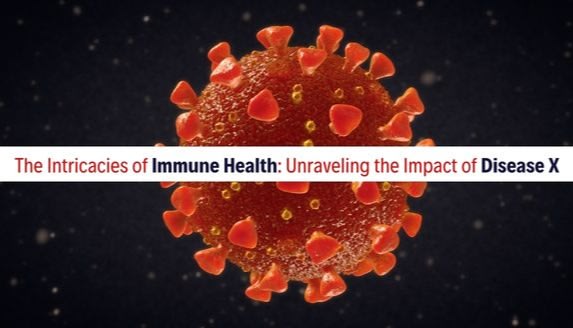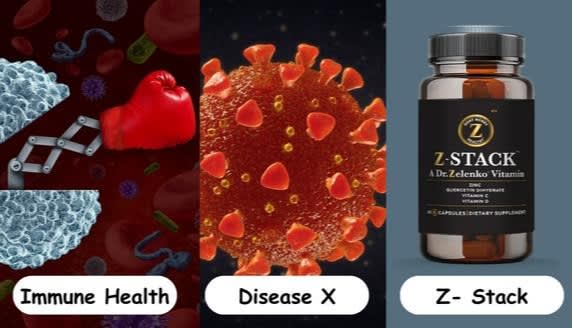Take care of your child's health and immunity with Kids Z-Spike Gummies: the best immune support formula for kids by Zelenko Labs LLC.
The Intricacies of Immune Health: Unraveling the Impact of Disease X
The Intricacies of Immune Health: Unraveling the Impact of Disease X
The human immune system is an astonishingly complex network of cells, tissues, and proteins that tirelessly guards our bodies against many threats. While we often take our immune health for granted, it's a delicate balance that various factors, including diseases, can disrupt. In this article, we will delve into the intricate relationship between immune health and Disease X. Although Disease X is fictional, it serves as a representative example to explore how various illnesses can affect our immunity and what steps we can take to bolster our defenses.
Disease X and Immune Health
Disease X and Immune Health
Imagine Disease X as a formidable new pathogen that has entered our hypothetical world. To understand its impact on immune health, we need to consider several key factors:
Immune Response Intensity
Immune Response Intensity
The immune system responds differently to various pathogens. Some elicit a robust response, while others trigger a more subdued reaction. Disease X's impact on immune health may depend on its ability to evade or overwhelm the immune system. For example, a highly contagious and rapidly mutating virus-like Disease X could strain the immune system's resources, potentially leading to exhaustion and dysfunction.
Immunoevasion Strategies
Immunoevasion Strategies
Some pathogens, like certain strains of the flu virus or HIV, have evolved intricate strategies to evade the immune system's surveillance. Disease X might possess similar mechanisms, making it challenging for the immune system to effectively recognize and combat the threat. This evasion can compromise immune health by prolonging the infection and weakening the body's defense mechanisms.
Long-Term Consequences
Long-Term Consequences
Disease X could leave a lasting imprint on immune health, even after the initial infection has been resolved. In some cases, conditions can alter the immune system's memory and response patterns. This may result in the immune system becoming less effective against other pathogens or even attacking the body's tissues, leading to autoimmune diseases.
Strengthening Immune Health in the Face of Disease X
Strengthening Immune Health in the Face of Disease X
While we may not be able to predict the specific nature of Disease X, there are several general strategies we can employ to bolster our immune health and prepare for unforeseen threats:
Vaccination
One of the most effective ways to enhance immune health is through vaccination. By getting vaccinated against known pathogens, we can reduce the likelihood of infection and the strain on our immune system.
Healthy Lifestyle Choices
Maintaining a healthy lifestyle is crucial for immune health. Eating a balanced diet and sleeping properly supports immune function.
Hygiene and Preventive Measures
Adhering to proper hygiene practices, including regular handwashing and maintaining sanitation, can minimize the chances of encountering pathogens such as Disease X. Additionally, following recommended preventive measures, such as wearing masks during outbreaks and practicing physical distancing, can further protect immune health.
Immunomodulators
Certain natural compounds and supplements, such as vitamin C, zinc, and probiotics, are believed to have immunomodulatory effects. While these should not be seen as a replacement for a balanced diet, they may provide an extra layer of support for immune health.
Stay Informed and Prepared
Staying informed about emerging infectious diseases and following public health guidelines is crucial for protecting immune health in the face of new threats like Disease X. Being prepared and knowing how to respond can significantly reduce the spread of infections.
Immune Resilience Across the Lifespan
Immune Resilience Across the Lifespan
To bolster immune health throughout the aging process, upholding a healthy lifestyle, which encompasses well-balanced nutrition, regular physical activity, and vaccination to guard against age-related infections such as influenza and pneumonia, is crucial.
As we start getting old, our immune system undergoes changes that can impact our immune health. This natural process, known as immunosenescence, can lead to a decline in immune function. Several factors contribute to this phenomenon:
Thymic Involution: The thymus, a vital organ for T cell development, gradually shrinks as we age, reducing the production of new T cells. This diminishes the immune system's ability to respond to new threats effectively.
Reduced Immune Cell Activity: Older individuals may experience reduced activity in certain immune cells, leading to slower response times and decreased effectiveness in combating infections.
Accumulated Exposures: Over a lifetime, we accumulate exposure to various pathogens, which can contribute to the development of memory cells but may also strain the immune system over time.
Gut Health and Immunity
Gut Health and Immunity
The gut plays a surprisingly significant role in immune health. The gut plays an unexpectedly substantial role in maintaining immune health. Inside the digestive system, there exists a diverse population of bacteria and various microorganisms, collectively known as the gut microbiota. This microbiota is instrumental in training and fine-tuning the immune system. Here's how it works:
Gut-Immune System Connection: The gut is closely connected to the immune system through a network of lymphoid tissue. This tissue houses immune cells and communicates with the gut microbiota, influencing immune responses.
Microbiota Diversity: A diverse and balanced gut microbiota is associated with robust immune function. An imbalance, known as dysbiosis, can lead to inflammation and compromise immune health.
Probiotics and Prebiotics: Incorporating probiotics (which are beneficial bacteria) and prebiotics (fiber-rich foods that provide nourishment for gut bacteria) into your diet can contribute to the maintenance of a well-balanced gut microbiota, thereby promoting immune health.
Genetic Factors in Immune Health
Genetic Factors in Immune Health
Genetics also plays a role in determining immune health. Some individuals may be genetically predisposed to certain immune-related conditions, such as autoimmune diseases or primary immunodeficiency disorders. Understanding one's genetic susceptibility can be valuable in proactive health management.
The Future of Immune Health
The Future of Immune Health
Medical research and technology advancements continue to reshape our understanding of immune health. Emerging fields like immunotherapy hold promise for treating various diseases, including cancer, by harnessing the immune system's power. Personalized medicine and gene editing techniques may also play significant roles in enhancing immune health in the future.
Conclusion
Conclusion
Our immune health is a multifaceted topic influenced by many factors, including the pathogens we encounter, our lifestyle choices, aging, gut health, mental well-being, and even our genetics. Disease X, while fictional, serves as a symbol of the potential challenges our immune systems face in an ever-evolving world of pathogens. To maintain robust immune health, we must remain vigilant, embrace healthy habits, and stay informed about the latest developments in immunology. By doing so, we empower ourselves to navigate the complexities of our immune systems and face the uncertainties of the microbial world with resilience and confidence.
Leave a Comment 👋
Leave a Comment 👋

The Intricacies of Immune Health: Unraveling the Impact of Disease X
Explore the complex interplay between immune health and Disease X. Discover how our immune systems adapt and ways to fortify them against emerging threats.

Immune Health, Disease X, and Z-Stack: A Comprehensive Guide to Strengthening Your Defense
Discover the key to fortified immunity against Covid-19 variants and Disease X with the Z-Stack Protocol.
